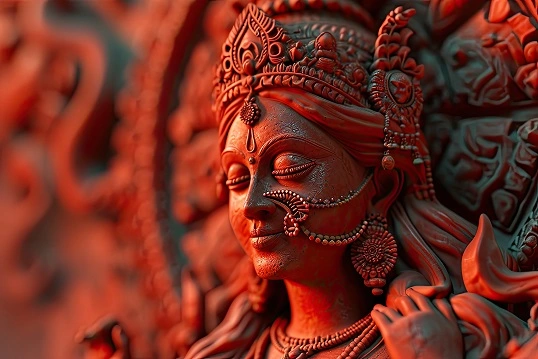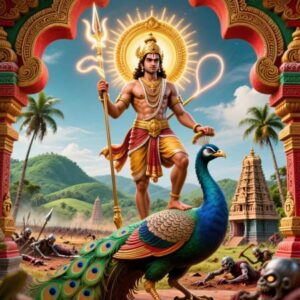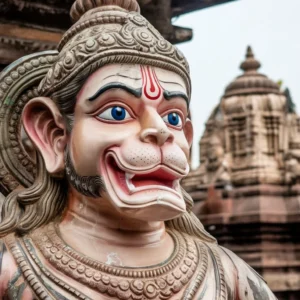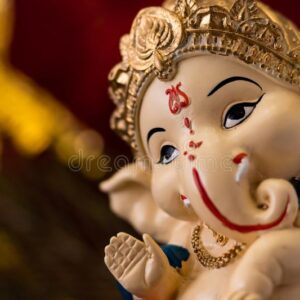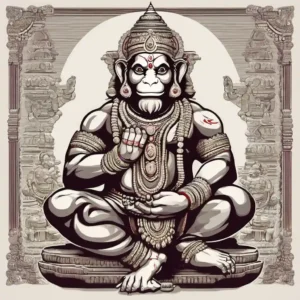Have you ever felt overwhelmed by life’s challenges and wished for a spark of divine strength to guide you? Maa Durga, the embodiment of power, compassion, and protection, holds the key. Her 32 Names (Durga Dwatrinshannama Mala) are more than just words—they’re a powerful spiritual tool to overcome obstacles, find courage, and invite peace into your life. Whether you’re chanting during Navratri or seeking daily inspiration, this guide will walk you through the 32 Names of Durga, their meanings, how to chant them, and nine miraculous benefits that can transform your life. Ready to connect with Maa Durga’s energy? Let’s dive in!

दुर्गा के 32 नाम
माँ दुर्गा के 32 नाम: इस सरल गाइड के साथ प्राप्त करें उनकी दिव्य कृपा
क्या आपने कभी जीवन की चुनौतियों से अभिभूत महसूस किया और चाहा कि कोई दैवीय शक्ति आपका मार्गदर्शन करे? माँ दुर्गा, जो शक्ति, करुणा और सुरक्षा की प्रतीक हैं, आपके लिए वह प्रकाश हैं। उनके 32 नाम (दुर्गा द्वात्रिंशन्नाम माला) केवल शब्द नहीं, बल्कि एक शक्तिशाली आध्यात्मिक साधन हैं जो बाधाओं को दूर करने, साहस प्रदान करने और जीवन में शांति लाने में मदद करते हैं। चाहे आप नवरात्रि में जाप करें या दैनिक प्रेरणा चाहते हों, यह गाइड आपको माँ दुर्गा के 32 नाम, उनके अर्थ, जाप की विधि और नौ चमत्कारी लाभों के बारे में बताएगा। माँ दुर्गा की ऊर्जा से जुड़ने के लिए तैयार हैं? आइए शुरू करें!
What Are the 32 Names of Maa Durga?
The 32 Names of Durga, found in ancient texts like the Durga Saptashati and Markandeya Purana, celebrate Maa Durga’s diverse forms—mother, warrior, protector, and creator. Each name reflects a unique quality, from strength to serenity. Here’s a glimpse of her divine names with their meanings:
- Durga: The invincible one who removes obstacles.
- Durgatinashini: Destroyer of sorrows and hardships.
- Jayadurga: Symbol of victory and success.
- Bhadrakali: Fierce yet peaceful protector.
- Mahakali: Annihilator of evil and darkness.
- Chandika: Goddess of fierce compassion.
- Sarvamangala: Bringer of universal auspiciousness.
- Siddhidatri: Granter of spiritual powers.
- Bhavani: Creator and nurturer of the universe.
- Ambika: The infinite compassionate mother.
- (See the full list in our downloadable PDF below!)
Visual Idea: Include an infographic showcasing all 32 names with short meanings in a vibrant, lotus-themed design to make it visually appealing and easy to reference.

What Are the 32 Names of Maa Durga
सामग्री सूची
- माँ दुर्गा के 32 नाम क्या हैं?
- 32 नामों का जाप कैसे करें (चरण-दर-चरण)
- 32 नामों के जाप के 9 चमत्कारी लाभ
- सांस्कृतिक और पौराणिक महत्व
- भक्ति के साथ जाप के नियम
- भक्तों की वास्तविक कहानियाँ
- सामान्य गलतियाँ और उनसे बचने के तरीके
- सामान्य प्रश्न (FAQs)
- निष्कर्ष: माँ दुर्गा के साथ अपनी यात्रा शुरू करें
- अपनी कहानी साझा करें
How to Chant the 32 Names (Step-by-Step)
Chanting Maa Durga’s 32 names is simple yet profound. Follow these steps to invite her blessings:
- Choose an Auspicious Time: Navratri, Fridays, or Tuesdays at sunrise or sunset are ideal.
- Prepare Yourself: Take a bath, wear clean clothes (red or yellow are auspicious), and feel fresh.
- Set Up Your Space:
- Place a red cloth in a quiet corner.
- Set up Maa Durga’s idol or picture.
- Offer loban (frankincense), a lamp, and red hibiscus flowers.
- Begin with Ganesha: Chant “Om Gam Ganapataye Namah” 3 times to remove obstacles.
- Chant the Names: Use a rudraksha or lotus seed mala to chant the 32 names 11, 21, or 108 times.
- Offer Prasad: Share jaggery, coconut, or laddoos as offerings.
- Close with Gratitude: Meditate for 5 minutes, thanking Maa Durga for her presence.
Pro Tip: Struggling with pronunciation? Use a guided audio chant (search for “Durga 32 Names Audio” on YouTube) or consult a priest for accuracy.
Interactive Element: Try our quick poll!
How many times do you plan to chant the 32 names?
- 11 times
- 21 times
- 108 times
Share your choice in the comments!

How to Chant the 32 Names
माँ दुर्गा के 32 नाम क्या हैं?
माँ दुर्गा के 32 नाम, जो दुर्गा सप्तशती और मार्कंडेय पुराण जैसे प्राचीन ग्रंथों में मिलते हैं, उनके विभिन्न स्वरूपों—माता, योद्धा, रक्षक और सृजनकर्ता—को दर्शाते हैं। प्रत्येक नाम उनके अनूठे गुणों को प्रकट करता है। यहाँ कुछ नाम और उनके अर्थ दिए गए हैं:
- दुर्गा: अजेय, बाधाओं को दूर करने वाली।
- दुर्गतिनाशिनी: दुखों और कठिनाइयों का नाश करने वाली।
- जयदुर्गा: विजय और सफलता की प्रतीक।
- भद्रकाली: भयंकर लेकिन शांतिदायी रक्षक।
- महाकाली: बुराई और अंधकार का नाश करने वाली।
- चण्डिका: उग्र करुणा की देवी।
- सर्वमंगला: सभी के लिए शुभता लाने वाली।
- सिद्धिदात्री: आध्यात्मिक सिद्धियों की दात्री।
- भवानी: विश्व की सृजनकर्ता और पालक।
- अम्बिका: अनंत करुणा वाली माता।
- (पूरा सूची हमारे डाउनलोड करने योग्य PDF में देखें!)
विजुअल आइडिया: सभी 32 नामों और उनके संक्षिप्त अर्थों के साथ एक रंगीन इन्फोग्राफिक शामिल करें, जिसमें कमल-थीम डिज़ाइन हो ताकि यह आकर्षक और आसानी से समझने योग्य हो
9 Miraculous Benefits of Chanting Durga’s Names
Chanting these names can transform your life in surprising ways:
- Protection from Negativity: Shields you from negative energies and adversaries.
- Overcome Obstacles: Clears life’s hurdles, big or small.
- Spiritual Growth: Deepens your connection to divine energy.
- Courage and Confidence: Banishes fear, empowering bold decisions.
- Mental Peace: Soothes stress and promotes emotional balance.
- Prosperity: Attracts wealth and abundance.
- Planetary Harmony: Reduces astrological doshas (e.g., Mangal Dosha).
- Wish Fulfillment: Helps manifest desires like jobs or relationships.
- Positive Vibes: Fills your home with peace and positivity.
Visual Idea: Add a colorful chart summarizing these benefits with icons (e.g., a shield for protection, a lotus for peace) to make it skimmable and engaging.
32 नामों का जाप कैसे करें (चरण-दर-चरण)
माँ दुर्गा के 32 नामों का जाप सरल लेकिन प्रभावशाली है। उनकी कृपा प्राप्त करने के लिए इन चरणों का पालन करें:
- शुभ समय चुनें: नवरात्रि, शुक्रवार या मंगलवार को सूर्योदय या सूर्यास्त का समय आदर्श है।
- खुद को तैयार करें: स्नान करें, स्वच्छ वस्त्र (लाल या पीले रंग के) पहनें और तरोताज़ा महसूस करें।
- पूजा स्थान तैयार करें:
- शांत कोने में लाल कपड़ा बिछाएं।
- माँ दुर्गा की मूर्ति या चित्र स्थापित करें।
- लोबान धूप, दीपक और लाल गुड़हल के फूल अर्पित करें।
- गणेश पूजा से शुरू करें: बाधाएँ दूर करने के लिए “ॐ गं गणपतये नमः” का 3 बार जाप करें।
- नामों का जाप करें: रुद्राक्ष या कमलगट्टे की माला का उपयोग करके 32 नामों का 11, 21 या 108 बार जाप करें।
- प्रसाद अर्पित करें: गुड़, नारियल या लड्डू का भोग लगाएं और बांटें।
- कृतज्ञता के साथ समापन: 5 मिनट ध्यान करें और माँ दुर्गा को धन्यवाद दें।
प्रो टिप: उच्चारण में परेशानी हो रही है? यूट्यूब पर “दुर्गा 32 नाम ऑडियो” खोजें या किसी पुजारी से सही उच्चारण सीखें।
इंटरैक्टिव तत्व: हमारा त्वरित पोल आज़माएँ!
आप 32 नामों का कितनी बार जाप करने की योजना बना रहे हैं?
- 11 बार
- 21 बार
- 108 बार
अपना जवाब कमेंट में साझा करें!
Cultural and Mythological Significance
The 32 Names of Durga are deeply rooted in Hindu traditions, especially during Navratri and Durga Puja. Found in the Durga Saptashati, these names embody Maa Durga’s power, compassion, and triumph over evil. In Bengal, group chanting during Durga Puja fosters community devotion, while individual chanting during Navratri amplifies personal spiritual energy. Fun fact: These names were revealed to sages in deep meditation, making them sacred mantras!
Story Time: Growing up, my grandmother would light a lamp every Navratri and chant these names with such devotion that the whole house felt alive with energy. It’s a tradition I now follow, and it’s like Maa Durga herself is guiding me through tough times. What’s your favorite Durga Puja memory? Share below!
32 नामों के जाप के 9 चमत्कारी लाभ
ये नाम आपके जीवन को आश्चर्यजनक रूप से बदल सकते हैं:
- नकारात्मकता से सुरक्षा: नकारात्मक शक्तियों और शत्रुओं से रक्षा।
- बाधाओं पर विजय: छोटी-बड़ी बाधाओं को दूर करता है।
- आध्यात्मिक उन्नति: दैवीय ऊर्जा से गहरा संबंध।
- साहस और आत्मविश्वास: भय को दूर कर निर्णय लेने की शक्ति देता है।
- मानसिक शांति: तनाव कम करता है और भावनात्मक संतुलन लाता है।
- समृद्धि: धन और सुख को आकर्षित करता है।
- ग्रह दोष निवारण: कुंडली दोष (जैसे मंगल दोष) को कम करता है।
- मनोकामना पूर्ति: नौकरी, विवाह जैसी इच्छाएँ पूरी करता है।
- सकारात्मक ऊर्जा: घर में शांति और सकारात्मकता लाता है।
विजुअल आइडिया: इन लाभों को आइकॉन (जैसे सुरक्षा के लिए ढाल, शांति के लिए कमल) के साथ एक रंगीन चार्ट में प्रस्तुत करें ताकि यह आसानी से समझने योग्य और आकर्षक हो।

Rules for Chanting with Devotion
Rules for Chanting with Devotion
To maximize the benefits, follow these guidelines:
- Purity: Avoid non-vegetarian food, alcohol, or tamasic habits during chanting.
- Consistency: Chant daily during Navratri or on Fridays/Tuesdays.
- Faith: Trust in Maa Durga’s power with full devotion.
- Environment: Choose a clean, distraction-free space.
- Pronunciation: Double-check with audio guides for accuracy.
सांस्कृतिक और पौराणिक महत्व
माँ दुर्गा के 32 नाम हिंदू परंपराओं, विशेष रूप से नवरात्रि और दुर्गा पूजा में गहराई से जुड़े हैं। दुर्गा सप्तशती में वर्णित ये नाम माँ दुर्गा की शक्ति, करुणा और बुराई पर विजय को दर्शाते हैं। बंगाल में, दुर्गा पूजा के दौरान सामूहिक जाप सामुदायिक भक्ति का प्रतीक है, जबकि नवरात्रि में व्यक्तिगत जाप आध्यात्मिक ऊर्जा को बढ़ाता है। मजेदार तथ्य: ये नाम गहन ध्यान के दौरान ऋषियों को प्रकट हुए थे, जो इन्हें पवित्र मंत्र बनाते हैं!
कहानी का समय: बचपन में, मेरी दादी हर नवरात्रि में दीप जलाकर इन नामों का जाप करती थीं, और पूरा घर दैवीय ऊर्जा से भर जाता था। यह परंपरा अब मैं निभाता हूँ, और ऐसा लगता है जैसे माँ दुर्गा स्वयं कठिन समय में मेरा मार्गदर्शन करती हैं। आपका पसंदीदा दुर्गा पूजा का पल कौन सा है? नीचे साझा करें
Real-Life Stories from Devotees
Devotees across the world have experienced miracles:
- Shruti, Homemaker: “Chanting every morning gave me unshakable calm during a family crisis.”
- Rahul, IT Professional: “The names helped me stay strong during a tough job transition.”
- Ananya, Spiritual Seeker: “Navratri chanting deepened my meditation like never before.”
Interactive Call: Have you experienced Maa Durga’s blessings? Drop your story in the comments—we’d love to hear it!
भक्ति के साथ जाप के नियम
अधिकतम लाभ के लिए इन दिशानिर्देशों का पालन करें:
- शुद्धता: जाप के दौरान मांस, शराब या तामसिक आदतों से बचें।
- नियमितता: नवरात्रि के दौरान या शुक्रवार/मंगलवार को प्रतिदिन जाप करें।
- श्रद्धा: माँ दुर्गा की शक्ति में पूर्ण विश्वास रखें।
- वातावरण: स्वच्छ, बिना विचलन वाला स्थान चुनें।
- उच्चारण: सटीकता के लिए ऑडियो गाइड का उपयोग करें।
Common Mistakes to Avoid
Don’t let these slip-ups dim your spiritual practice:
- Incorrect Pronunciation: Always verify with audio or a guru.
- Inconsistency: Stick to a regular chanting schedule.
- Distractions: Keep phones and noise away during worship.
- Impurity: Ensure your body and space are clean.

Common Mistakes to Avoid
भक्तों की वास्तविक कहानियाँ
दुनियाभर के भक्तों ने चमत्कारों का अनुभव किया है:
- श्रुति, गृहिणी: “हर सुबह जाप करने से मुझे पारिवारिक संकट में अटूट शांति मिली।”
- राहुल, आईटी प्रोफेशनल: “नामों ने मुझे नौकरी बदलने के कठिन समय में दृढ़ता दी।”
- अनन्या, आध्यात्मिक साधक: “नवरात्रि जाप ने मेरे ध्यान को पहले से कहीं अधिक गहरा किया।”
इंटरैक्टिव कॉल: क्या आपने माँ दुर्गा की कृपा का अनुभव किया है? अपनी कहानी कमेंट में साझा करें—हमें सुनना अच्छा लगेगा!
सामान्य गलतियाँ और उनसे बचने के तरीके
इन गलतियों से अपनी आध्यात्मिक साधना को कमजोर न होने दें:
- गलत उच्चारण: ऑडियो या गुरु से सही उच्चारण सीखें।
- अनियमितता: नियमित समय पर जाप करें।
- विकर्षण: पूजा के दौरान फोन और शोर से बचें।
- अशुद्धता: शरीर और पूजा स्थान को स्वच्छ रखें।
FAQs: Your Questions Answered
Q: Can women chant the 32 names?
A: Absolutely! Anyone with devotion can chant them.
Q: Is Navratri the only time to chant?
A: No, Fridays and Tuesdays are also auspicious.
Q: How many times should I chant?
A: 11, 21, or 108 times are common—choose what feels right.
Q: Where can I find the full list of names?
A: Download our free PDF below for the complete list with meanings!
सामान्य प्रश्न (FAQs)
प्रश्न: क्या महिलाएँ 32 नामों का जाप कर सकती हैं?
उत्तर: बिल्कुल! कोई भी भक्ति के साथ जाप कर सकता है।
प्रश्न: क्या नवरात्रि के अलावा जाप कर सकते हैं?
उत्तर: हाँ, शुक्रवार और मंगलवार भी शुभ हैं।
प्रश्न: कितनी बार जाप करना चाहिए?
उत्तर: 11, 21 या 108 बार जाप आम है—अपनी सुविधा चुनें।
प्रश्न: पूरी सूची कहाँ मिलेगी?
उत्तर: नीचे हमारे मुफ्त PDF में अर्थों के साथ पूरी सूची डाउनलोड करें!
Conclusion: Start Your Journey with Maa Durga
The 32 Names of Maa Durga are a gateway to her divine energy, offering protection, courage, and peace. Whether you’re facing challenges or seeking spiritual growth, chanting these names can be a life-changing practice. Start today—light a lamp, chant with devotion, and feel Maa Durga’s blessings flow into your life.
निष्कर्ष: माँ दुर्गा के साथ अपनी यात्रा शुरू करें
माँ दुर्गा के 32 नाम उनकी अनंत ऊर्जा का प्रवेश द्वार हैं, जो सुरक्षा, साहस और शांति प्रदान करते हैं। चाहे आप चुनौतियों का सामना कर रहे हों या आध्यात्मिक विकास चाहते हों, इन नामों का जाप जीवन बदलने वाला हो सकता है। आज ही शुरू करें—एक दीप जलाएँ, भक्ति से जाप करें और माँ दुर्गा की कृपा को अपने जीवन में अनुभव करें।

